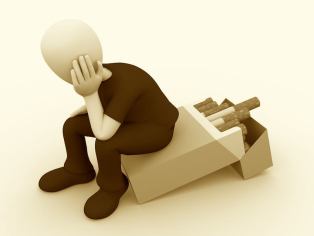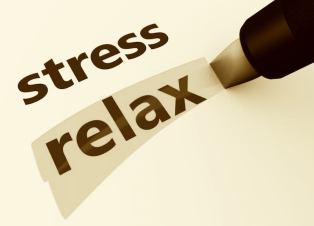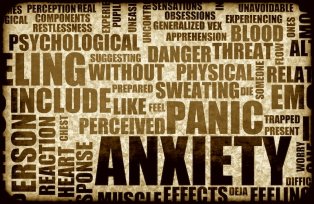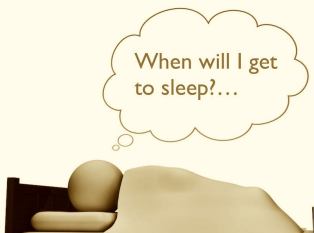 Managing Stress
Managing Stress
When we talk about our level of personal stress we often draw on terms that we also use in describing a physical force being applied to an object.
Perhaps we feel 'under pressure', or that we are becoming 'increasingly tense', or even that we think we may be 'about to snap'.
If the demands on us are reasonably challenging, allowing us to feel useful and satisfied about our contribution, then this amount of stress can be viewed in a positive and healthy way.
Our stress level becomes a problem when we feel we are under too much mental or emotional pressure to cope with significant parts of our life.
Whenever we have this sort of extreme stress in our life it can have a major impact on our thoughts & emotions, how our body feels & functions, and on our behaviour.
Over time, unrelentingly high stress levels can lead to anxiety, depression and angry outbursts that seem 'out of proportion' or completely unjustified to others witnessing them.
Health-related issues that may be linked to chronic stress include:- high blood pressure, weight management problems, poor blood sugar regulation, exhaustion, insomnia and irritable bowel syndrome.
The initial reaction each of us has to any significant demand made of us (a.k.a. a stressor) is believed to be derived from our automatically-activated defence mechanism to extreme physical danger.
This collection of 'hard-wired' behaviours is usually called the 'fight-flight-or-freeze' response to stress/threat…
And it seems to have been available to humans, (plus many animals, including other mammals and reptiles) since ancient times…
Because our ancestors needed an extremely quick & effective way of coping with the severe and immediate physical threats that were present in their world, the method could not be under conscious control - as it would have been far too slow and unreliable.
Gaining a better understanding of the origins of our 'fight-flight-or-freeze' threat response… can greatly assist us in finding effective ways of dealing with the stresses of modern day life.
To do this - let's travel back in time… if we imagine one of our male ancestors was out hunting and he anticipated he might soon be in some danger based on him noticing a few signals from his environment… his body would respond as if this was really about to be the case - the safest course of action.
As this happened, the hormone adrenaline (a.k.a. epinephrine) would have been released…
his heartbeat and breathing would quicken and in an instant he would experience a massive boost in his available energy levels and potential for rapid movement…
All so that he would be able to aggressively confront ('fight') the danger or make a quick & successful escape ('flight').
Our hunter ancestor would remain in this highly alert state until he satisfied himself that either this was a 'false alarm' (and his automated defence mechanism would gradually shut-down - returning his body to its normal state over time) or that he could identify the specific source of 'real' danger.
Let's imagine the actual threat now facing our ancestor is a dangerous animal. At this point the automated response would be telling him to 'attack' or 'run', or in some cases to 'stay put' (i.e. 'freeze') until there was no longer any danger or the situation had evolved in some other way.
Which option was chosen would be based on an instant calculation about his best chance of survival…
If his automatic processing concluded he was considerably faster than the animal - this would very likely be to run and escape. Alternatively, if the conclusion was that he was appreciably stronger and would be able to easily over-power the animal without much risk of significant injury - the chosen option would probably be to attack.
However, if the animal had not seen him and there was no real clarity on his chances of surviving unscathed from attacking or running, it would be best from a survival point of view to stay put ('freeze').
In the 'freeze' state he would still be highly alert with an intense focus on the source of the danger in case the situation changed. His breathing would be very shallow and his muscles would be rigid - allowing him to be practically motionless.
Many predatory animals' attention will be drawn to any movement - so staying completely still has significant survival value.
The 'freeze' state is essentially the 'fight-or-flight' response 'on hold'.
Assuming our imagined ancestor managed to save himself from the animal threat, it's highly likely that he would need a certain period of time to recover before he could return to hunting, and be able to successfully respond to any new severe threats. So if he wanted to survive, he would need to get himself to a safe place and rest.
Nowadays, when we experience a 'fight-flight-or-freeze' type response to a less extreme stressor, the physical aspects of this, such as a racing heart and breathing rapidly, or our body full of unused adrenaline, will usually not be quite so helpful. And we may or may not give ourselves time to fully recover afterwards…before we face further challenges.
There is another key hormone (cortisol) that is activated in addition to adrenaline as part of our standard 'threat/stress' response. And these two hormones in combination lead to our bodies being quick to get aroused in response to a perceived threat/stressor but then much slower to return to their usual functioning.
Whenever our ancestors were facing a life or death threat… a wide range of internal processes that were not essential to their immediate survival would be automatically switched off or significantly constrained…
In modern times, the internal processes that can still be stopped or inhibited when we feel threatened or stressed include our digestion, growth & cell renewal, sexual & reproductive functions and our immune system.
When we are highly stressed for any length of time, we are likely to be weakening our body's ability to cope with life, and this may lead to us experiencing more stress - even where the external demands placed on us remain broadly the same.
If an animal is suddenly facing immense and unavoidable danger… it can be so overwhelmed that it is 'rooted to the spot' (like a deer caught in a car's headlights) or it can resort to 'playing dead' (as the opossum is famed for doing).
Both these 'last-resort' threat responses seem to be based on the logic that some predatory animals can only eat if they experience their prey is alive and actively resisting being attacked, and may lose interest in any prey that is completely unresponsive and immobile.
Various terms are in use to describe these two 'freeze/immobility' type responses. The key difference from the more alert 'freeze' state is that these behaviours seem to occur when the animal considers itself to be in a hopeless situation.
Humans can also exhibit similar responses when facing intense fears/phobias or in other forms of traumatic situation. In such cases, a person can exhibit a degree of dissociating themself from the overly-demanding experience as well as finding themself unable to move.
As the 'fight-flight-or-freeze' response to threat has to be extremely fast-acting, it seems to operate on a very loose 'pattern-matching' basis. An example of a possible pattern description might be along the lines of 'all big dogs are dangerous'. And because of the consistently approximate nature of the mechanism, it can never be 100% accurate.
The overriding aim is to 'play safe' - to always alert us to potential danger - even if the number of times we have 'false' alerts is quite high.
Q. How has this vital mechanism - essential for our survival, remained active and in good working order in each of us, as our world has become much safer and with far fewer physical threats?
The solution that appears to have been chosen is to let the 'fight-flight-or-freeze' response be triggered by situations that are much less demanding and also to widen its scope beyond immediate physical dangers.
Becoming instantly more alert for modern day challenges can often be a blessing, but the stress response can also cause a number of problems that we need to be aware of, and ideally find a way of managing around if we don't want our level of stress to become problematic…
Q. How can we break free of feeling under too much stress and relax more?
Common modern day sources of stress for many people include:- work, relationships & personal finances. And significant life changes such as:- moving home, getting married, starting a new job, negotiating a divorce & financial settlement, becoming a parent… can also be highly stressful. Sometimes, it's just lots and lots of relatively small hassles that build up.
Often different people are likely to experience contrasting levels of stress in relation to the same demands placed on them. And each of us can be somewhat stressed by a situation we face one day and then on another day the same thing happening will hardly affect our stress level at all.
The good news that comes from these observations is it suggests that…
We can ease the level of stress we experience even without there being a change in the demands/situations we face.
It can be useful to create a picture in our minds of our own imaginary 'bucket of stress' which fills up with water from a tap above. The tap water represents the flow of new stresses we are facing and there are holes in the bottom of the 'bucket' which reflect our ability to get rid of our stress over time.
Our 'stress bucket' will nearly always contain some water otherwise we will not be living a life with any challenges. However…
the higher the water level in our 'bucket', the more we are building up to problematic stress levels.
By keeping track of our situation throughout the day and making a note of key events, we can become increasingly aware of what makes us stressed, what helps us relax, and when we may need to take urgent action to keep things manageable.
Unfortunately, when we’re under a great deal of pressure, it can be extremely difficult to become aware of each rapid unspoken thought going through our head.
Thankfully, hypnosis can be of great assistance in helping us recall the thoughts, feelings, body sensations and behaviour we typically have in response to the various potentially stressful demands made of us. And once we know more fully what we're currently doing, we can decide what needs to change…
For most of us effectively managing our stress level usually consists of being successful in 3 areas:-
- Keeping the demands made of us at a manageable level;
- Minimising the stressful impact that each new demand has on us;
- Maintaining a healthy and supportive lifestyle.
1. Keeping the demands made of us at a manageable level
Perhaps we are a generous person who greatly prefers to say 'yes' to
most things asked of us. However, finding it hard to say 'no' to anything is a recipe for a great deal of stress.
Sometimes we find we have taken on too much and then it's usually best to talk with others about reducing our load.
Handling this sort of situation will probably require us being both reasonably assertive and self-confident. [Hypnotherapy can be helpful in relation to achieving improvements in these areas].
Also, where we are making significant internal demands of ourselves - it may be useful to explore and potentially revise our personal standards/rules and the beliefs that underpin them - so that we are not putting ourselves under undue pressure. [Hypnotherapy can help replace troublesome beliefs and unwanted habitual behaviour].
2. Minimising the stressful impact that each new demand has on us
The way we see things has a profound effect on how we feel and how we respond to life’s demands on us.
The results of a 5-year study of female patients with Breast Cancer were published in the medical journal 'The Lancet' in Oct 1979, and showed that the way we think about challenging situations can even have a measurable impact on our very survival.
The study indicated that the recurrence-free survival rate for those patients who had initially reacted to the news that they had cancer was significantly greater for those who had responded …
- by denial (i.e. “the test results are incorrect - there’s nothing wrong with me”), or who had
- a fighting spirit (i.e. “I’ll get through this and have a full life again”),
compared to those who had responded…
- with quiet acceptance (i.e. “I’ll have the treatment suggested and then it’s the luck of the draw”), or
- feelings of helplessness and hopelessness (i.e. “that’s it then, my life is over”).
Whether or not we are conscious of it each of us actively creates the meaning/significance of all the events in our life.
Each time we are presented with a demanding situation - we can decide how we want to think about it. However, what often makes this more challenging is we tend to be given a thought automatically, immediately after our initial stress response has been activated.
When we receive such an automatically-generated thought that’s negative & unhelpful (i.e. “I am going to make a fool of myself in front of everyone”) and we don’t dispute it in our mind, we can start a somewhat problematic sequence of events…
- It may well lead us to feel a particular way (i.e. self-conscious, embarrassed and/or fearful);
- As we move into that emotional state our body may become uncomfortable (i.e. red cheeks, feeling hot, perspiring);
- And as a result we may then have the urge to take action or make some physical movement to attempt to alleviate things (i.e. disappear to the loo, or no longer look other people in the eye).
The behavioural urges we have when we experience day-to-day stress, will usually be watered-down versions of the 'fight-flight-or-freeze' threat response. [Whether that's to be aggressive in our communication (watered-down 'fight') or to avoid the situation entirely - rather than face it (watered-down 'flight')].
Unfortunately, unless we notice and act to stop this chain of events we can often keep the cycle going… our feelings, body sensations and our desire to move or take action leading to a further troublesome thought, with the sequence continuing…
At best this keeps us in a less than helpful place mentally, emotionally and physically …
At worst our thoughts, feelings and body sensations get more intensely negative…
Spiralling down and down until perhaps we feel compelled to take some potentially ill-advised and counter-productive action.
Replacing our existing habitual cycles of response to stressful situations with new healthier responses is a key part of reducing the stress we experience.
We can think of our stressful experience being like a stool supported by four legs:- what we are thinking, how we are feeling emotionally, what we are feeling in our bodies, and how we are acting or feel drawn to behaving. By altering one or more of these legs we can destabilise our 'stool of stress' and the experience is likely to be far less demanding, allowing us to break free of our current unhelpful cycle.
For instance a heated argument between two lovers can turn into a passionate embrace just by one of them changing their behaviour and the other responding. Or…
When people watch a horror film and are scared they often find a way of laughing to alleviate their tension and fear.
And for many people excitement has the same body sensations as being nervous. However when we are excited our thoughts & expectations are positive and when we are nervous they tend to be rather negative.
You can probably recall a number of life events where your experience was changed instantly. It might have been caused by someone else’s action or perhaps it was down to something you did - either consciously or by accident.
Wouldn’t it be great if you could repeat that process whenever required to turn a stressful event into something far less demanding?
We can think of our problematic relationships as having a shared 'stool of stress' with 8 legs, the four legs relating to each person on different sides.
So whenever you feel an argument is brewing, if you are able to focus on thinking and communicating differently from the way you usually do, there is every chance that the stool will become unstable and the situation will be diffused. [Hypnotherapy can support people looking to change their habitual thinking and communication within relationships].
We can sometimes feel that there are just too many areas of stress to tackle all in one go. And where this is the case, it's helpful to deal with the minority of things that will make the biggest difference. (That this tends to be true in a wide variety of situations is known as the Pareto Principle, or 80:20 rule).
We then have the option of going back to work on the remaining sources of stress if we feel this is necessary.
It’s often extremely useful to create a short written stress-management plan that we can refer to now and again throughout the day.
This will remind us of the actions we are taking to improve things in each key area of our life…
and re-enforce the feeling that we are 'moving forward' rather than 'staying stuck'.
And by not keeping all the stressful demands we have continuously in the forefront of our minds we can focus our thoughts on the current task. Which should help to minimise the chances of us worrying or becoming overly anxious about what might happen if we don't deal successfully with everything 'on our plate'.
Of course, sometimes we may not catch a stress response/cycle as soon as we would like, and on those occasions our aim needs to be to reduce the level of our ‘stress bucket’ to a more manageable level as quickly as possible.
Bringing our breathing back to normal, helping our mind & body return to a state of relaxation, and temporarily moving away from where we experienced this most recent bout of stress - can all contribute to achieving this. [Hypnotherapy can assist in making this sort of instant de-stress approach readily available].
3. Maintaining a healthy and supportive lifestyle
By making adjustments to our daytime & evening routine we can potentially reduce the level of our 'Stress Bucket' ready for the following day. And over time, we may be able to significantly increase our capacity to cope with the demands of life - effectively creating a bigger stress bucket that’s not so easily filled as a result.
Taking ourselves away from any stressors as much as possible throughout the day…
will allow our mind & body to recover before the next batch of demands & stress comes our way.
At work, this means making the best use of any breaks we have, and ensuring we take our full allotted time for lunch - consuming our food & drink somewhere other than at our desk.
Depending on our personality, we may want to chat to our favourite co-workers during these breaks to de-stress, or we may seek somewhere peaceful & quiet to be on our own - so we can relax & recharge our batteries. Making a point of stretching in some way and even briskly walking at every opportunity will both help.
Of course, some form of personal exercise regime will provide many stress-relief benefits too.
Having objects & resources that support us to stay positive in our thinking, and that either sooth our emotions or help us see the funny side of life can be very helpful.
A small number of family photos to keep us connected with loved ones at work… enjoying inspiring or humorous books & films whenever we can… and listening to uplifting music at home or elsewhere… can all make a big difference to how calm we feel at the end of the day.
Having relaxing baths (but not too late in the evening to affect our sleep) or connecting with supportive friends & family members on a regular basis are all likely to help us unwind.
And we may find that becoming more organised, improving our time management skills and our ability to prioritise tasks effectively are all helpful in expanding our stress bucket.
As we know, ongoing stress can disrupt various internal processes including our digestion. It therefore makes a great deal of sense to put extra focus on eating and drinking as healthily as we can, both in terms of the quality of products we purchase and that we consume them in a relaxed manner.
Drinking only modest quantities of both coffee and alcohol, or stopping entirely, can also contribute to having a greater capacity to cope with life’s demands.
If you are currently a smoker, then becoming a non-smoker is likely to be beneficial too.
Ensuring we get a good night’s sleep at approximately the same time each night helps this become a secure habit over time. [Hypnotherapy can assist people improve the quality & duration of their sleep].
If you are struggling to cope with all the stresses in your life… Perhaps now is the time to work with someone else to get a fresh perspective & to make real progress.
As with all forms of therapy - the precise results achieved may vary from person to person.









